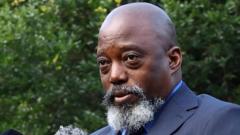The Democratic Republic of Congo's (DRC) senate has made a decisive step by stripping former President Joseph Kabila of his immunity, thereby opening the door for possible prosecution on treason charges related to allegations of his support for rebel factions in the eastern part of the country. This significant vote saw nearly 90 senators in favor while only five opposed the motion, as the DRC government seeks to address the rising violence associated with the M23 militia.
Kabila, who ruled the country from 2001 until 2019, has purportedly been implicated with a "substantial body of documents, testimony and material facts" tying him to the armed group, which has recently gained control of additional territories in the resource-rich eastern region. Although Kabila has refrained from commenting on these allegations, he has previously denied any association with the insurgents. He did not attend the senate session to challenge the charges against him.
Moreover, Kabila was granted the title of "senator for life" post-presidency, which previously provided him with legal immunity. The military prosecutor's request to revoke this privilege follows years of conflict involving the M23, which has roots stretching back to 2012. In a bid to resolve the ongoing turmoil, Kabila has expressed intentions to return to the DRC, having been living in South Africa for two years.
The political landscape remains tense, especially after the recent banning of Kabila's party, the People's Party for Reconstruction and Democracy (PPRD), due to its perceived ambiguous stance regarding the M23's territorial control. Justice Minister Mutamba has since ordered a seizure of Kabila's assets, insisting that he must face the legal proceedings in the DRC.
Analysts caution that Kabila's potential trial may exacerbate the already precarious situation in the DRC, where ongoing clashes between the M23 and Congolese military are prevalent. The DRC's government is seeking peace agreements, with recent discussions occurring between DRC and Rwanda, who is accused of backing the rebels. As the conflict continues to displace countless civilians, the ramifications of Kabila's prosecution raise critical questions about the future stability of the nation.




















